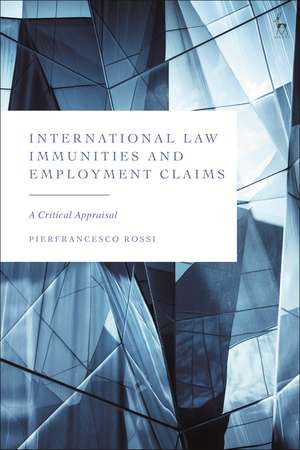International Law Immunities and Employment Claims: A Critical Appraisal
Autor Pierfrancesco Rossien Limba Engleză Paperback – 14 iun 2023
| Toate formatele și edițiile | Preț | Express |
|---|---|---|
| Paperback (1) | 299.29 lei 6-8 săpt. | |
| Bloomsbury Publishing – 14 iun 2023 | 299.29 lei 6-8 săpt. | |
| Hardback (1) | 541.13 lei 6-8 săpt. | |
| Bloomsbury Publishing – dec 2021 | 541.13 lei 6-8 săpt. |
Preț: 299.29 lei
Preț vechi: 365.62 lei
-18% Nou
Puncte Express: 449
Preț estimativ în valută:
57.27€ • 62.40$ • 48.26£
57.27€ • 62.40$ • 48.26£
Carte tipărită la comandă
Livrare economică 23 aprilie-07 mai
Preluare comenzi: 021 569.72.76
Specificații
ISBN-13: 9781509953011
ISBN-10: 1509953019
Pagini: 296
Dimensiuni: 156 x 234 x 25 mm
Greutate: 0.41 kg
Editura: Bloomsbury Publishing
Colecția Hart Publishing
Locul publicării:London, United Kingdom
ISBN-10: 1509953019
Pagini: 296
Dimensiuni: 156 x 234 x 25 mm
Greutate: 0.41 kg
Editura: Bloomsbury Publishing
Colecția Hart Publishing
Locul publicării:London, United Kingdom
Caracteristici
Explores the impact of jurisdictional immunity in international law on employment law
Notă biografică
Pierfrancesco Rossi is Assistant Professor of International Law at the University of Teramo, Italy.
Cuprins
1. Introduction 2. The International Law Immunities from Civil Jurisdiction - An Overview I. Introduction II. Basic Concepts: Immunities, Jurisdiction and Substantive Law III. The Functional Rationale of the International Law Immunities from Civil Jurisdiction IV. Scope of State Immunity A. The Sources of the Law of State Immunity B. The Problematic Distinction between Acta Jure Imperii and Acta Jure Gestionis V. Scope of International Organisation Immunity A. The Sources of the Law of International Organisation Immunity B. The Variety of Standards of International Organisation Immunity VI. Scope of Diplomatic and Consular Immunity VII. Conclusions 3. The Undue Persistence of Absolute Immunity in Employment Litigation I. Introduction II. Alleged Lack of Subject-Matter Jurisdiction of the Territorial State A. Exclusive Jurisdiction of Foreign States and International Organisations B. Exclusive Competence of International Organisations' Internal RemediesIII. Absolute Immunity Based on Functionalist Policy Arguments IV. Absolute Immunity Based on the Public Nature of Employment V. Absolute Immunity Based on the Official Nature of Employment A. Employment as an Official Act of Diplomatic and Consular Agents B. Employment as an Official Act of International Organisations VI. Persistence of Absolute Immunity under Express Treaty Provisions VII. Conclusions: The Need for Limited Immunity Standards in Employment Litigation 4. Restrictive State Immunity Standards in Employment Matters I. Introduction II. The Emergence of Employment-Specific Approaches to Restrictive State Immunity III. Approaches Based on the Nature of the Workplace A. The 'Workplace Test' in Immunity Instruments and Judicial Practice B. Drawbacks of the 'Workplace Test' and its Declining Relevance IV. Approaches Based on the Status and Functions of the Employee A. The Diffusion of the 'Status and Functions Test' in State PracticeB. The Varied Outcomes of the 'Status and Functions Test' C. The 'Status and Functions Test' under the UN Convention on State Immunity V. Approaches Based on the Nationality and Residence of the Employee VI. Approaches Based on the Subject Matter of the Claim A. The Distinction between Monetary and Non-monetary Claims B. The 'Subject-Matter Test' under the UN Convention on State Immunity VII. Approaches Based on Forum Selection Clauses in the Employment Contract VIII. Restrictive State Immunity in Employment Matters under Customary International Law IX. Conclusions 5. Limited Immunity Standards for Employers Other than the State I. Introduction II. Limited Standards of International Organisation Immunity in Employment Matters III. Limited Standards of Diplomatic and Consular Immunity in Employment Matters A. Distinguishing Official and Non-official Employment of Staff B. Employment as a Commercial Activity not Subject to Diplomatic Immunity IV. Conclusions 6. Reconciling Immunities and the Employees' Right of Access to Justice I. Introduction II. Approaches Deferring to International Obligations to Grant Immunity to Employers III. Approaches Requiring the Availability to Employees of Alternative Means of Redress A. The Diffusion of the 'Alternative Remedies Test' in Judicial Practice B. The Requirement of Availability of the Alternative Remedy C. The Requirement of Effectiveness of the Alternative Remedy IV. The Risk of Remedy Gaps and the Need for a Consistent Approach V. Conclusions 7. Conclusions I. Argument No 1: Absolute Employer Immunity Is an Unfounded Legal Myth II. Argument No 2: Well-Defined Standards of Limited Employer Immunity Can Be Identified III. Argument No 3: The Equivalent Protection Test Should Apply to All Employer Immunities IV. The Way Forward: Human Rights Law as an Agent of Coherence
Recenzii
This work is a much-needed study in a little-researched field of international, labor and human rights law . It is a far-reaching and in-depth investigation, with a detailed reflective analysis . I encourage its reading and discussion, with the understanding that this will enrich the debate and stimulate the development of new works on the subject.
